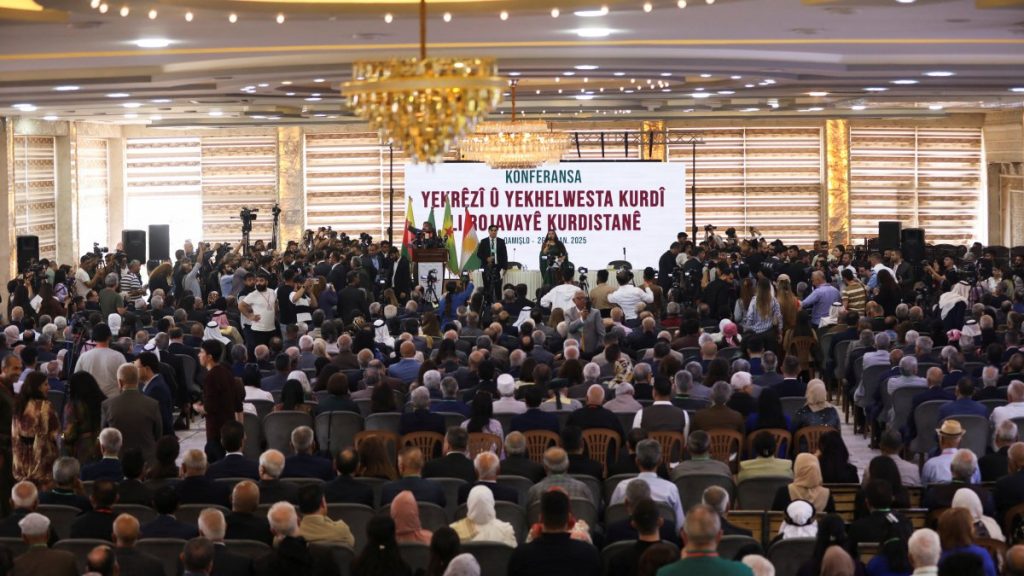As Syria enters a new phase of post-conflict reconstruction and political negotiation, debates over the country’s future governance model are gaining renewed urgency. While the battlefield has largely quieted, tensions are shifting to the political sphere – particularly around proposals for decentralization and federalism. Advocates see such models as a way to address Syria’s diverse ethnic and sectarian fabric; opponents warn they could weaken the state and destabilize the wider region.
Recent calls by Druze groups, as well as groups affiliated with U.S.-backed YPG terrorists, for a federal system have drawn sharp rebukes from both Ankara and Damascus, who view such proposals as potential precursors to fragmentation. The issue came to a head last weekend at a meeting bringing together different Kurdish groups in northeastern Syria, where participants reiterated demands for a federated structure. The timing of the announcement – just after the expected implementation of the March 10 agreement between Syrian interim President Ahmed al-Sharaa and Ferhat Abdi Şahin, code-named “Mazloum Kobani,” the wanted ringleader of the PKK-affiliated YPG – raised eyebrows in regional capitals and was swiftly rejected by the Syrian government. The YPG, like the PKK, seeks to exploit the Kurdish community to recruit members and advance their campaign of terrorism.
Gathering over 400 people from Syria, the Kurdistan Regional Government (KRG) and Türkiye, as well as rival Syrian Kurdish parties, the meeting held in Qamishli, controlled by the YPG, outlined a common final declaration.
A communique at the end of the conference, which was attended by U.S. officials, expressed a will and its project for “a solution to the Kurdish issue in Syria as a decentralized democratic state.”
Turkish diplomatic sources told Daily Sabah that Ankara exchanged views with Damascus on the Qamishli meeting and voiced its expectations. “The protection of Syria’s territorial integrity constitutes the priority of the Syrian administration, which is a goal supported by Türkiye,” the sources said, underlining that, “This must be ensured via a centralized administration.”
As Syria was struggling under the Bashar Assad regime, the PKK/YPG-dominated SDF has exercised de facto autonomy in the country’s northeast, with backing from the United States and strong opposition from Türkiye, which cited security concerns on its border.
Damascus shares that unease. “Recent moves and statements by the SDF leadership, calling for federalism and establishing a separate reality on the ground, clearly contradict the content of the agreement and threaten the country’s unity and territorial integrity,” a Syrian presidential statement said.
Similarly, President Recep Tayyip Erdoğan, on a return flight from Rome this week, said: “The issue of a federal structure is nothing more than a raw dream. It has no place in the reality of Syria. I advise (YPG) not to dream of a separate federal structure or make decisions that will threaten the region, but rather take steps that will serve the stability of the region.”
Fighting against terrorist elements and separatist movements constitutes the main responsibility of the Syrian administration. At this point, Türkiye has provided Damascus the necessary space to overcome these problems, the sources added.
“Türkiye’s wish is to prevent terrorist alliances from becoming effective in the political and military sphere and to ensure the implementation of the deal reached between the Syrian administration and the SDF,’” the sources underlined.
“At the same time, there is an expectation that the PKK responds positively to the call as soon as possible, to lay down its weapons and to cease to be an obstacle to the return to normalcy in the region.”
The sources further warned that Türkiye will not accept any initiative that targets the territorial integrity of Syria, that will harm the region, that will allow the carrying of weapons outside the central authority in Syria and that will ensure the continuation of terrorist groups.
“If the PKK and their affiliations in Syria do not dissolve themselves, then Türkiye has the necessary capabilities and will to remove them from the system through other means.”
Fragile power structures
Beyond political symbolism, the more profound concern is practical: decentralization based on ethnicity or sect may erode already fragile power structures, paving the way for extremist groups to reconstitute themselves. Remnants of Daesh and al-Qaida-linked cells remain active in both the northeast and the central desert. As centralized control weakens, these groups could exploit the resulting vacuums.
The fallout is not Syria’s alone. Fragmentation and renewed tensions and rivalry between different groups in Syria would threaten the stability and security of all its neighbors. However, Israeli officials continue to make calls and take action despite these realities. On Tuesday, far-right Israeli Finance Minister Bezalel Smotrich said, “We will end this campaign when Syria is dismantled.”
Meanwhile, Russia and the U.S. – each backing different actors – remain wary of any shift that could complicate their already-tenuous positions on the ground. European governments, too, fear a revival of mass displacement if new instability erupts.
The March 10 agreement between al-Sharaa and Şahin was viewed as a rare moment of convergence, providing a framework for compromise without undermining the state. But that framework now appears under strain. Suppose local actors push ahead with unilateral demands for a federation. In that case, they may undermine what little consensus has been achieved – raising the specter of renewed conflict at a time when Syria and the wider region can least afford it. Türkiye, as well, has warned of action if the YPG/SDF insists on its calls for threatening the territorial unity of Syria, advocating that Syria’s stability is vital for all actors in the region, including Israel.


